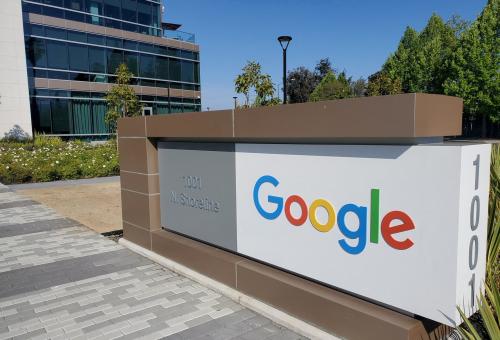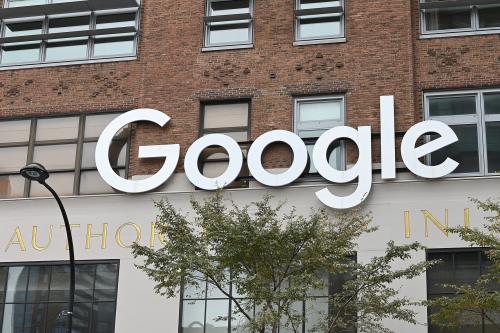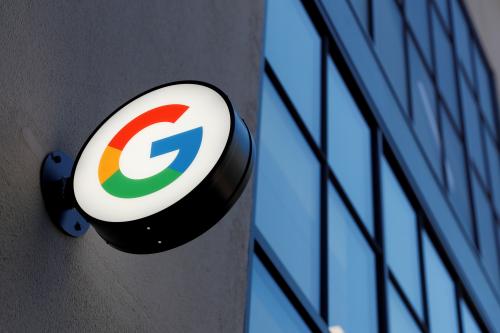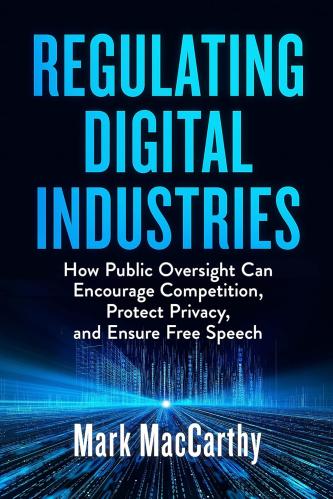On October 20, the U.S. Department of Justice filed its long-awaited antitrust suit against Google. Examining possible remedies for the company’s alleged anticompetitive conduct reveals some important lessons for the promotion of competition in digital markets. The first lesson is that it is difficult for antitrust agencies to develop and administer effective measures to promote competition in digital markets that have already tipped to dominant providers. The second is that lawmakers should consider establishing a specialized regulatory agency to foster and maintain competitive alternatives in digital markets and to regulate dominant companies in the public interest if competition does not take hold.
DOJ argues that Google has a dominant position in search, accounting for “nearly 90 percent of all general-search-engine queries in the United States, and almost 95 percent of queries on mobile devices.” DOJ alleges that Google maintains this position through a series of unlawful exclusionary contracts with device manufacturers such as Apple, mobile operators such as AT&T and browser providers such as Mozilla. These contracts, covering 60% of all general search queries, give Google search preferred position, taking advantage of consumer tendencies to stay with default settings. Another 20% of searches occur through Google’s own Chrome browser, which naturally privileges the affiliated Google search engine.
Suppose the courts find that Google acted unlawfully to maintain a monopoly in general search. Then what? DOJ isn’t very specific about the remedies it seeks. It asks the court to enjoin Google from continuing to engage in the described anticompetitive practices and others with similar effect and purpose. But it also asks the court to “enter structural relief as needed to cure any anticompetitive harm.” What could that be?
One possibility, leaked to the press but not mentioned in the suit itself, is the forced sale of Google’s Chrome browser, which is the leading computer browser in the U.S. with 60% market share. It also has 35% of the mobile browser market. Presumably, the new owner of the Chrome browser would also be forbidden from entering into anticompetitive contracts with Google.
These measures together would free up a substantial portion of search from exclusionary arrangements, but it still wouldn’t guarantee competitor success. People are used to using Google search. Moreover, its results seem superior to those of current competitors, perhaps because scale effects might make search algorithms more efficient with larger numbers of search results to learn from.
What else could be done to jump start general search competition? An additional pro-competitive measure might be to ensure that consumers have a free and fair choice among competing search engines.
The European Commission tried to do this in 2018 after finding that Google’s Android contracts with mobile device manufacturers and mobile operators illegally gave pride of place to the Google search app. The Commission required Google to establish a mechanism for consumer choice of search engines. Google decided to present new Android users with a search choice screen during set up. It held auctions for access to this Android choice screen, and the privacy-friendly search engine Duck-Duck-Go won a spot. But competitors aren’t satisfied with the auction approach, and it hasn’t changed market outcomes. According to Google, 97% of new Android users still chose Google’s search app.
Perhaps antitrust authorities need to go even further. They could handicap Google to make up for the harmful effects of past anticompetitive practices, even if that means putting a government thumb-on-the-scales to advantage an inferior search product for a period of time to give competitors a fair chance to get up to scale. A mandated default to a randomly chosen alternative search engine might be one such measure.
But even this might not work because defaults are not destiny. As Google points out, even with the forces of inertia operating against it, users seem to prefer Google’s search app. When Yahoo bought preferential treatment in Mozilla’s Firefox browser, most users promptly switched back to Google.
What this discussion makes clear is that jumpstarting competition in search will not be a one-time occurrence. It will require ongoing supervision of the industry, experimentation with different measures, assessment of results and then the administration of further pro-competitive initiatives if the earlier ones have failed.
This ongoing promotion of competition is really not the province of a generalist law enforcement agency like the Department of Justice, which is equipped for occasional interventions, not for ongoing regulatory supervision. It is not even clear that the antitrust laws as currently understood both in the U.S. and in Europe would allow authorities to try measure after measure in the hopes of creating competition in a market that has tipped to a dominant provider.
When faced with a durable monopoly, antitrust authorities do not typically try to dismantle it. This is certainly the message from the Microsoft case. Twenty years after the U.S. antitrust case, Microsoft still dominates the market for personal computer operating systems, with 87% market share versus 10% for Apple. U.S. antitrust authorities have taken no action against this ongoing monopoly. In Europe, where Microsoft dominates the productivity software market with over 90% of the market, competition policy authorities do not seek to create alternatives to Microsoft in this market. Rather, they try to stop Microsoft from extending this monopoly into related lines of business, such as by limiting technical integration of the LinkedIn app with Microsoft’s office productivity software.
Antitrust authorities repeat the mantra that a monopoly is not itself illegal. All they are permitted to do under the antitrust laws is to take action against anticompetitive conduct. If lawmakers want an agency to engage in sustained efforts to create a viable competitor to the Google search engine, they might have to mandate that through separate legislation empowering an agency to supervise the industry and seek to create and maintain search competition.
A model for the promotion of competition in digital markets like search is the initiative begun by the Federal Communications Commission in the 1970s to instill competition into the telecommunications industry it regulated. This effort was given a huge impetus by the Court-ordered breakup of the integrated AT&T system in 1984, and by the Telecommunications Act of 1996. But it was the agency itself that supervised the efforts to bring competition to the industry. With so few providers of telecommunications and broadband services today, it might seem that the competitive results don’t justify the generations-long struggle. But the pro-competitive initiative would have been completely hopeless if it had not been for the determined efforts of a dedicated regulatory agency with ongoing supervisory responsibility over the industry.
The limited results of the attempt to promote telecommunications competition suggest another benefit from creating a regulatory structure for digital markets like search. Google might have a durable monopoly in search, regardless of what policymakers try to do to instill competition into this market. If competition really is unsustainable in a digital market like search, an industry-specific regulatory agency can protect the public even in the absence of competition.
Consumers depend on essential services like search for full participation in today’s social, economic and political life. If that service is controlled by a single company as is the case today, and if repeated efforts to create viable competitors fail, then the public would still need to be protected from monopoly abuse. Public service regulation might not be a first choice, but it might be the only choice to protect the public from myriad injuries made possible when companies providing essential services have durable monopolies in essential services. That would be the second mission of a specialist search regulator, and another important lesson to be derived from the DOJ’s case against Google.
Apple, Google, and Microsoft are general, unrestricted donor to the Brookings Institution. The findings, interpretations and conclusions in this piece are solely those of the author and not influenced by any donation.
The Brookings Institution is committed to quality, independence, and impact.
We are supported by a diverse array of funders. In line with our values and policies, each Brookings publication represents the sole views of its author(s).










Commentary
Remedies that can sustain search competition in the DOJ case against Google
October 28, 2020